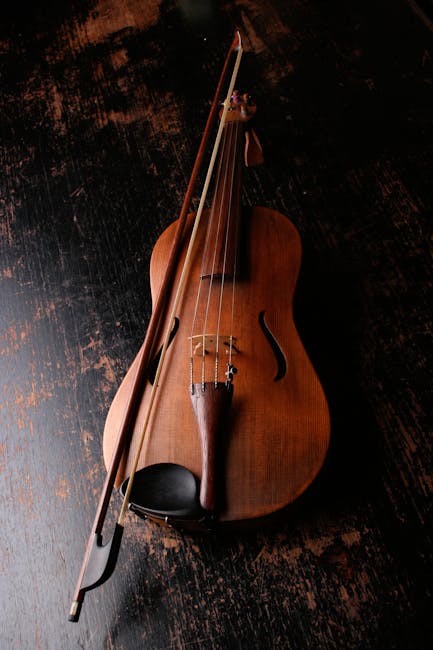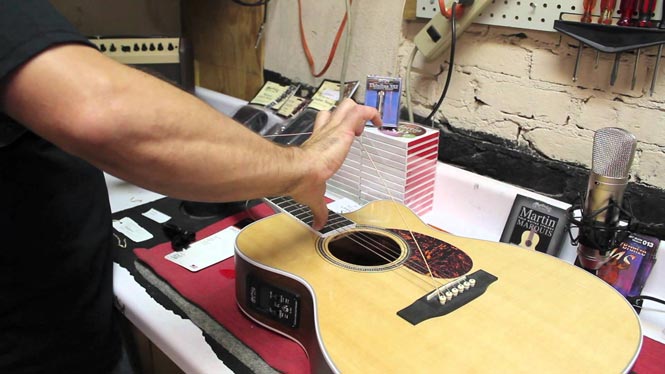Attention all guitar enthusiasts and caretakers of the beloved acoustic guitar! Are you tired of your strings sounding more like a screeching cat than a beautifully tuned instrument? Do you cringe at the sight of dust bunnies nesting in your fretboard? Fear not, for we have compiled a list of essential tips to help you maintain the health and beauty of your acoustic guitar. So grab your polish, tune up your skills, and let’s embark on a musical journey to a well-maintained instrument!
Contents
- 1
- 2 Selecting the Right Cleaning Agents and Techniques for Your Acoustic Guitar
- 3 Changing Strings Regularly to Maintain Sound Quality and Playability
- 4 Protecting Your Guitar from Scratches, Dents, and Direct Sunlight
- 5 Storing Your Acoustic Guitar Safely When Not in Use
- 6 Scheduling Professional Inspections for Long-Term Maintenance
- 7 FAQs
- 8 Strum on, Rockstar!
care“>Understanding the Importance of Humidity Control in Guitar Care
When it comes to taking care of your guitar, humidity control is no joke. Just like how you need to shower and moisturize to keep your skin in tip-top shape, your guitar also needs proper humidity levels to stay in tune.
So why is humidity control so important for guitar care? Well, let me tell you, dear reader, that a lack of proper humidity can wreak havoc on your beloved instrument. Here are a few reasons why:
- Prevents Cracking: Low humidity can cause the wood of your guitar to dry out and crack, which is not a look you want to go for. Keep your guitar moisturized, folks!
- Avoids Warping: High humidity can cause the neck and body of your guitar to warp, leading to all kinds of tuning and playability issues. Do your guitar a favor and control that humidity!
So, next time you’re tempted to leave your guitar out in the elements or in a stuffy room, remember the importance of humidity control. Your guitar will thank you with sweet, sweet tunes.
Selecting the Right Cleaning Agents and Techniques for Your Acoustic Guitar
When it comes to cleaning your beloved acoustic guitar, using the right cleaning agents and techniques is crucial to keeping your instrument looking and sounding its best. Here are some tips to help you maintain your guitar’s pristine condition:
- Choose the right cleaning agent: Avoid harsh chemicals or abrasive cleaners that can damage the delicate finish of your guitar. Instead, opt for a gentle guitar polish or cleaning solution specifically designed for use on acoustic guitars.
- Use a soft cloth: When cleaning your guitar, always use a soft, lint-free cloth to avoid scratching the surface. Microfiber cloths are a great choice for gently removing dust and fingerprints without damaging the finish.
- Don’t forget the fretboard: The fretboard is an often overlooked part of the guitar that can accumulate dirt and grime over time. Use a specialized fretboard cleaner and a soft brush to remove any buildup and keep your frets in tip-top shape.
Remember, regular cleaning and maintenance is key to preserving the beauty and longevity of your acoustic guitar. By selecting the right cleaning agents and techniques, you can ensure that your instrument stays in top condition for years to come.

Changing Strings Regularly to Maintain Sound Quality and Playability
As any musician will tell you, changing strings regularly is the key to maintaining that crisp sound quality and smooth playability that we all love. Think of your strings like the tires on your car – they wear out over time and need to be replaced to keep things running smoothly.
So how often should you be changing those strings? Well, if you’re a hardcore player who shreds for hours every day, you might want to swap them out every couple of weeks. If you’re more of a casual strummer, every couple of months should do the trick.
When it comes time to change those strings, don’t be intimidated! It’s a quick and easy process that will have you back to rocking out in no time. Just follow these simple steps:
- Loosen the old strings
- Remove the old strings
- Clean the fretboard and body of your guitar
- Put on the new strings and tune them up

Protecting Your Guitar from Scratches, Dents, and Direct Sunlight
Everyone knows that guitars are like babies: they need constant care and attention to stay happy and healthy. If you want to keep your beloved instrument looking and sounding its best, follow these tips for protecting it from scratches, dents, and the dreaded direct sunlight.
First and foremost, invest in a sturdy guitar case or gig bag. This will not only protect your guitar from accidental bumps and scrapes, but also shield it from the harsh rays of the sun. Make sure to choose a case with a plush interior lining to cushion your guitar and keep it safe and cozy.
When transporting your guitar from place to place, always handle it with care. Avoid dragging it along the ground or banging it against walls – unless, of course, you’re going for that “vintage relic” look. Remember, scratches add character…at least that’s what we like to tell ourselves!
Lastly, never leave your guitar out in direct sunlight for extended periods of time. Just like humans, guitars can suffer from sunburn – except instead of peeling skin, you’ll end up with warped wood and faded finishes. Keep your guitar in a cool, shady spot when not in use, and it will thank you with sweet, sweet music for years to come.

Storing Your Acoustic Guitar Safely When Not in Use
So you’ve finally splurged on that fancy acoustic guitar you’ve been eyeing for months. Congratulations! But now comes the important task of storing it safely when not in use. You wouldn’t want your precious musical investment to get damaged, right?
First things first, find a sturdy guitar case to protect your instrument from dust, moisture, and accidental bumps and scratches. Make sure the case is a snug fit for your guitar to prevent it from sliding around. And if you’re feeling extra fancy, why not choose a case with a plush lining for that added touch of luxury?
Next, pick a safe spot to store your guitar. Avoid areas with extreme temperatures or humidity, as these can warp the wood and affect the sound quality. Instead, opt for a cool, dry place away from direct sunlight and high-traffic areas. A closet or corner of your room should do the trick.
Lastly, don’t forget to loosen the strings a bit before storing your guitar for an extended period. This helps relieve tension on the neck and prevents warping. And remember, a well-stored guitar is a happy guitar! Treat it right, and it’ll reward you with beautiful music for years to come.
Scheduling Professional Inspections for Long-Term Maintenance
Now that you’ve committed to long-term maintenance for your property, it’s time to schedule those all-important professional inspections. Think of it as giving your home a check-up at the doctor’s office – just with less waiting room magazines and more hard hats.
When it comes to scheduling these inspections, it’s crucial to find a reliable company that knows their stuff. You don’t want just any old Joe Schmo poking around your plumbing or climbing on your roof. Look for professionals with experience, certifications, and a solid reputation. Trust me, you don’t want to end up with a “handyman” who’s more “man” than “handy.”
Once you’ve found the right team for the job, make sure to create a detailed schedule for your inspections. Keep track of when each inspection is due and set reminders so you don’t forget. It’s like playing a game of maintenance Tetris – fitting all the pieces together to keep your property in tip-top shape.
Remember, these inspections are crucial for catching potential issues before they turn into costly nightmares. Plus, you’ll have the peace of mind knowing that your property is in good hands. So grab your calendar, put on your scheduling hat, and get ready to conquer the world of long-term maintenance like the property pro you are!
FAQs
What is the best way to clean an acoustic guitar?
Think of your guitar like a delicate flower that needs some TLC. Use a soft, lint-free cloth to gently wipe down the body and strings. Just don’t go overboard with any fancy cleaning products or you might end up with a shiny guitar that can blind unsuspecting audiences.
How often should I change my guitar strings?
Are your strings starting to sound like they’ve been through a mud bath? It might be time for a change! Regular players should aim to change their strings every 1-3 months, but if you’ve been neglecting your guitar like a forgotten toy in the attic, it might be time for a change sooner.
What’s the deal with humidity and guitars?
Imagine if you were stuck in a sauna all day – you’d be pretty grumpy too! Guitars are sensitive creatures and need just the right amount of humidity to stay in tune. Invest in a humidifier to keep your guitar happy and sounding sweet.
Should I use a guitar stand or case for storage?
Let’s be real, your guitar likes to lounge around just as much as the next guy. While a stand is great for easy access, consider popping your guitar in a case when not in use to protect it from pesky pets, clumsy roommates, or any other potential hazards.
How can I prevent damage to my acoustic guitar while traveling?
Road trips can be a blast, but your guitar might not agree. Invest in a sturdy case or gig bag to protect your guitar from the bumps and bruises of travel. And just to be safe, maybe serenade your guitar with a comforting lullaby during those turbulent plane rides.
Strum on, Rockstar!
Keep those strings polished and that wood shining. Your acoustic guitar will thank you with sweet, sweet melodies for years to come. Remember, a well-cared-for guitar is a happy guitar. So show it some love and keep on strumming!



